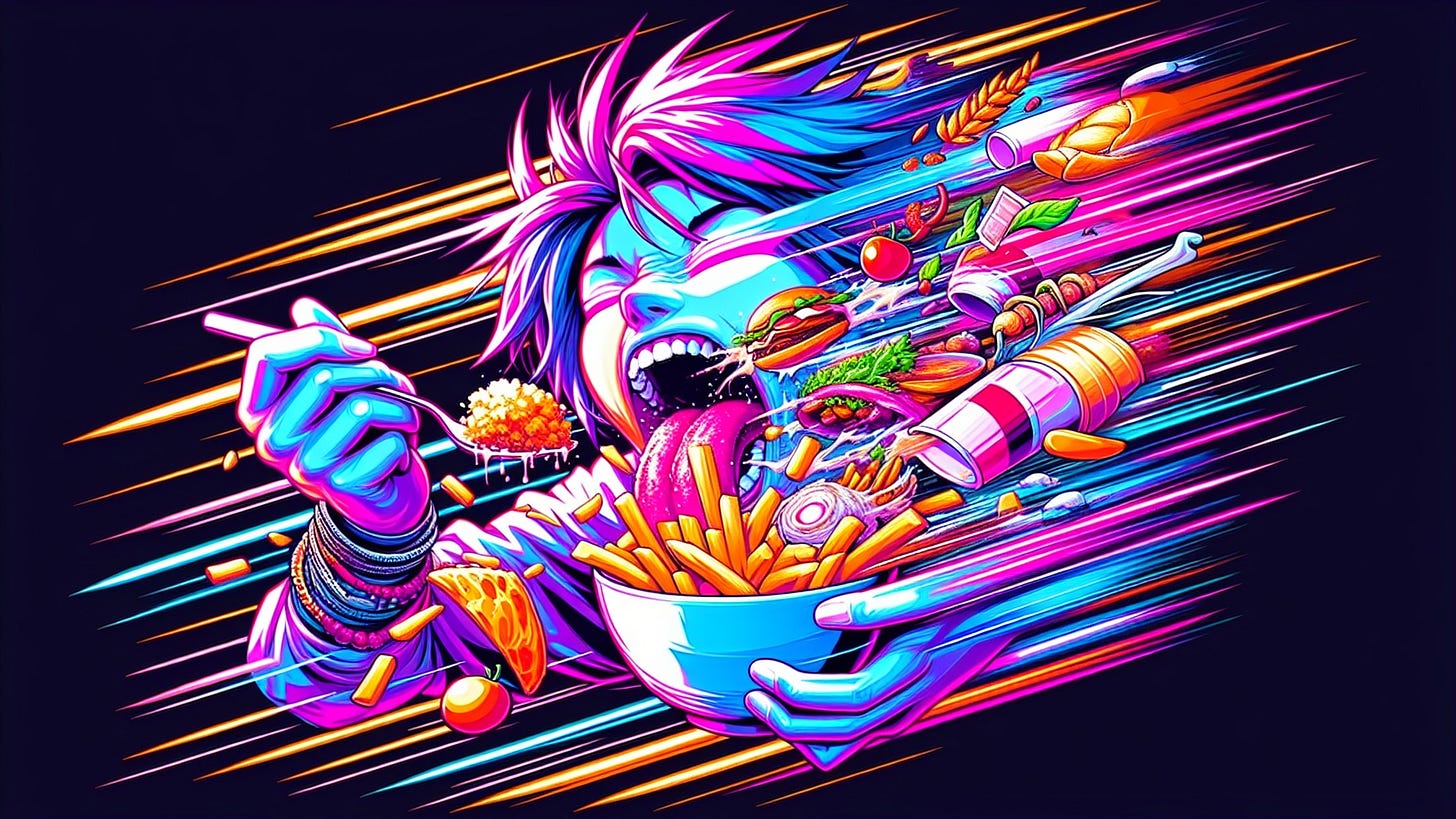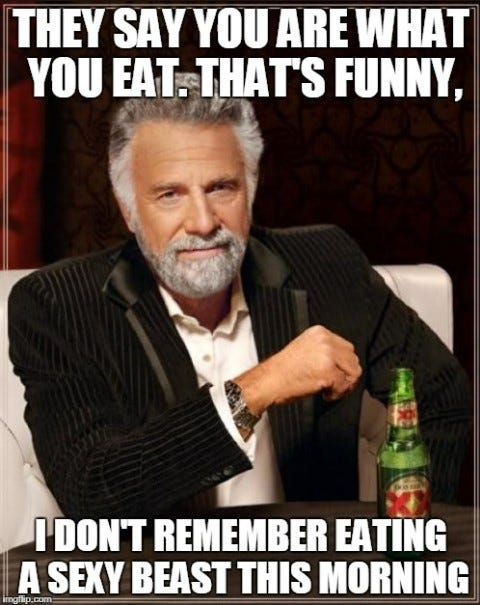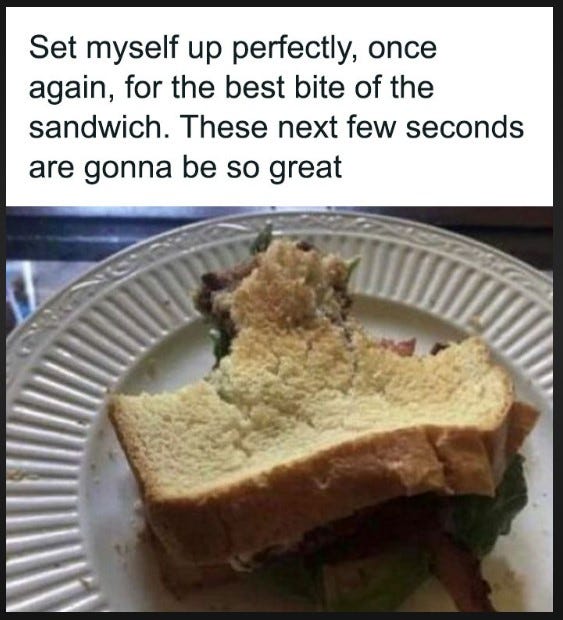Intentional Eating: Pace Yourself! This Isn't a Race
Intentional Eating #1: Speed is the root of all mindless eating
Hello dear reader,
This is Intentional Eating Part 1: Pace Yourself!
Intentional eating is the opposite of mindless eating. Let’s enrich our lives by being less zombie and more aware!
In this post, I’m looking at speed. How fast do we eat, and what happens if we slow down a tad? Does eating fast cause problems? Are slow eaters a little lighter, do they fit in their jeans better?
And how can we remember to slow the frick down?
Check the end of this post to join the Challenge of the Week. Special prize to the winner!
HI. I’m Tim from Time2Thrive, a newsletter that helps people find simple ways to get healthier, eat with intention, and care for their bodies.
Here are the most recent posts sent to subscribers:
Learn to do a “transcendental” meditation using a mantra
Intentional Eating (Choice) vs. Intuitive Eating (Goblin Mode)
How gluten affects me and many others: Are Us Silly Snowflakes Actually Sensitive to Gluten?
Did you know that hitting the heart icon ❤️ above or sharing this post makes it easier for people to find this newsletter? It also shows me that you appreciate my work!
You can subscribe with your email to make sure you never miss my posts:
How did you learn to eat when you were little? Was your family supportive, tension-free, and filled with good role models?
Mine was not.
I had to eat fast when I was small. You never knew if there would be enough to go around. My mom cut our food up into small pieces so it would look like there was more. Sometimes we relied on charity from my grandparents, who dropped off sacks of potatoes and canned mackerel.
We didn’t eat at a table. We didn’t have one.
My brother and I were dished up at the stove, and we sat on wooden chairs in front of the black and white TV. Usually, Dad sat with us, but Mom just leaned in the doorway and ate standing up.
This is not the environment to learn good eating habits. We shoveled it in like someone was gonna grab the plate back and let us starve.
Fast forward a few(!) years, to present day. I was still eating super fast, like my life depended on it. Like a seagull eating a hotdog.
Childhood habits are hard to break. I didn’t even realize that I was eating so fast.
Last week, while enjoying Leyla Kazim’s A Day Well Spent, I was given this life-changing podcast recommendation: Just One Thing. I chose to listen to just one of the things:
Eat Slowly – why simply eating slower could improve your digestion and lower your blood sugars
This fantastic podcast episode was recorded by Dr. Michael Mosley on BBC Radio 4. Unfortunately, the doctor has passed away, but his work lives on.
Eating slower has massive benefits, and it’s free and easy to learn. It’s a basic life skill that you hear of, but it doesn’t get the attention it deserves. Read on to find out why you need to eat slower—like your life depends on it!
Enjoy Your Food More
As you talk to your friend, you glance out of the corner of your eye at the waitress station. Is it coming yet? Is your food on the way? It is!
Trying to look nonchalant, you pretend you didn’t notice the waitress bringing the goods your way. You lean toward your dinner partner and avoid looking at the approaching feast. Yes! It’s almost here! As your nose picks up the tantalising scent of freshly cooked food, drool almost comes out of your mouth, forcing you to swallow.
“Oh! It’s here!” you say with fake surprise. “ I was so engrossed in your witty conversation that I lost all track of time and didn’t even notice she was bringing it!”
Then you dig in. And you inhale that food like a vacuum cleaner sucking up easily suckable things.
Seven minutes later, you drop your fork. Groaning, you realize that your stomach nearly burst a little because of the speed at which it was forced to expand.
Would you have a better experience if you slowed it down a little?
Enjoy the food more
Taste different flavors
Show appreciation and gratitude to everyone around you
Be more couth
Fact: It’s impossible to enjoy your food as much if you eat too fast. You’re cheating yourself!
Let’s consider the social aspect. When we eat with others, are we better able to socialize and have a good time when we hoover like it’s a hot dog eating contest or when we savor each bite, taking moments to talk and sip our drink before the next?
Is this a race? Or a fun experience with our friends/ family/ lover?
Improve Your digestion
As you eat slowly, chewing your food better, it gets broken down into smaller, more easily digested bits. At the same time, more saliva gets mixed in. The more spit mixes with the food, the easier it will move through your system, and the better it is for your gums, teeth, throat, etc.
Saliva also jumpstarts the digestion process and helps your body regulate insulin.
Eating slowly avoids stressing the system and pushing it to its limits. Fast eaters cram food in so fast that there isn’t time for all of the stomach fluids to mix properly with everything. It’s like rush hour downtown instead of a steady trickle of traffic.
The stomach and its functions are crucial to the body's overall health. We owe it to ourselves to give it all the advantages, and that means eating at a slower pace.
Fast Eaters Gain Weight
Fast eaters weigh more than slow eaters. Not only do they eat more at each meal, but they snack more too. It has a lot to do with the hunger hormones released when you pound back the food like you’re racing. That leads you to go searching for snacks in an hour or so.
Researchers consistently find that eating slower results in taking in about 10% less food over time. That 10 % adds up. The average person will gain 1 to 2 pounds per year, up to about 10%. There seems to be a correlation here. I’m no mathematician, but NOT EATING as much food will probably lead to weighing less?
So. Eating slower could keep us from gaining weight as we age, or even to lose a bit.
Fast Eaters Are More Stressed
Rip open the fridge, grab a block of cheese, cut off a few slices, and put one in your mouth. Reach back in and grab the pickle jar, dip in with your fingers and grabe a pickle. Eat your snack quickly by the sink, dump the knife on the stack of dirty dishes, and walk away. High-stress eating.
Stop at the convenience store, stand in line to buy a bag of salty snacks, and pour it down your throat while you sit behind the wheel of your car.
Eat your sandwich while walking to the next meeting.
Have you ever eaten in a rush? This is zombie behavior. I’ve been guilty of it for most of my life.
Do you want to relax? Then you need to slow down your food intake.
Sit down at a table if possible, take a deep breath, and take it one bite at a time.
Slowing down will activate your vagus nerve and allow you to calm your storm. Cortisol levels will drop, and heart rate will be slower. Your stomach will be happy and digesting properly.
How to Do It
Alright, Tim, you’ve convinced me.
So how do I do this slow eating thing?
Here’s what I’m doing for the next couple of weeks to bake it into my routine. I was one of the worst fast-eating offenders out there, and I’m going to give this a hardcore shot.
This is my intention: to spend at least 30 minutes per meal and enjoy the food so thoroughly that I am totally satisfied and won’t want food for hours.
Sit down to eat. At a table if possible. No standing by the sink, no leaning in the doorway, no nibbling while preparing the food. Wait until I’m sitting.
Don’t eat anything out of a box, container, or bag. Put it on an actual plate.
No distractions. Flip the phone over, or put it somewhere else.
Take small bites— half as big as usual.
Make a point of tasting the food fully.
Chew twice as long as you used to. Minimum of 10 chews? More?
Take sips of water (or whatever you’re drinking) between bites.
Stop and put the fork down every so often.
If you’re eating with someone else, ask a question or listen to what they’re saying between mouthfuls before returning to the next bite.
The Weekly Challenge
I challenge you! Join me in slow eating for one week.
It’s a simple challenge that could pay off for you big time.
enjoy your food more
digestion works better
less stress
might lose weight (or at least not gain any)
enhanced street cred!
Would you like to join me? For one week, do your best to follow some or all of the nine slow-eating tips above. Then, report back here on how it went. I’ll pick a random challenge winner, who will receive something special from Time2Thrive prize box.
If you’re in, leave a comment below.
Just Think: Eat slower, and you will reduce your chance of choking to death on unchewed food to almost zero!
I mean, there’s still that tiny chance that a small bird will fly in your mouth unexpectedly…
Bonus Resources for Paid Members of Time2Thrive:








Great topic!
Hubby is finally slowing down and actually tasting the food he eats.
There is such a thing as too slow. My son was always a slow eater. By the time he finished bfast I was making lunch. He is too thin. He’s 27 and I’m relieved when he tells me he didn’t forget to eat. Meanwhile, I’ve been exploring going kosher. The energy around food, where it comes from, how the animals are slaughtered, thanking
G-d before the meal, etc add a spiritual element to eating that I’ve never considered.
I really like this - thanks for the reminder. I often eat mindlessly when I'm watching a Netflix show while I'm eating. I try to do that as little as possible.